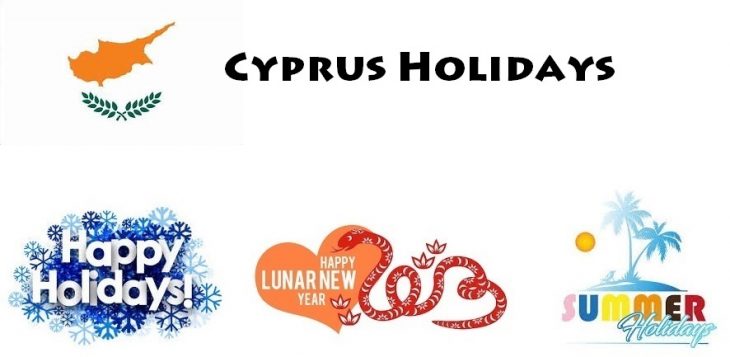Cyprus Holidays
Cyprus Public Holidays
Searching for the national holidays in Cyprus? All public holidays in Cyprus are treated like Sundays. This means that most of the Cyprus employees have a day off and all schools are closed on these office holidays. If you are planning a trip to Cyprus and want to know what the national and regional holidays are, check the details in the tables below.
List of Official Holidays in Cyprus for Year 2020
| # | Date | Holiday | Day |
| 1 | January 01, 2020 | New Year’s Day | Wednesday |
| 2 | January 06, 2020 | Epiphany | Monday |
| 3 | March 02, 2020 | Green Monday | Monday |
| 4 | March 25, 2020 | Greek Independence Day | Wednesday |
| 5 | April 01, 2020 | National Day | Wednesday |
| 6 | April 17, 2020 | Orthodox Good Friday | Friday |
| 7 | April 20, 2020 | Orthodox Easter Monday | Monday |
| 8 | April 21, 2020 | Orthodox Easter Tuesday | Tuesday |
| 9 | May 01, 2020 | Labour Day | Friday |
| 10 | June 08, 2020 | Orthodox Pentecost Monday | Monday |
| 11 | August 15, 2020 | Dormition of the Theotokos | Saturday |
| 12 | October 01, 2020 | Cyprus Independence Day | Thursday |
| 13 | October 28, 2020 | Greece National Anniversary Day | Wednesday |
| 14 | December 25, 2020 | Christmas Day | Friday |
| 15 | December 26, 2020 | Boxing Day | Saturday |
List of Official Holidays in Cyprus for Year 2021
| # | Date | Holiday | Day |
| 1 | January 01, 2021 | New Year’s Day | Friday |
| 2 | January 06, 2021 | Epiphany | Wednesday |
| 3 | March 15, 2021 | Green Monday | Monday |
| 4 | March 25, 2021 | Greek Independence Day | Thursday |
| 5 | April 01, 2021 | National Day | Thursday |
| 6 | April 30, 2021 | Orthodox Good Friday | Friday |
| 7 | May 01, 2021 | Labour Day | Saturday |
| 8 | May 03, 2021 | Orthodox Easter Monday | Monday |
| 9 | May 04, 2021 | Orthodox Easter Tuesday | Tuesday |
| 10 | May 24, 2021 | Orthodox Pentecost Monday | Monday |
| 11 | August 15, 2021 | Dormition of the Theotokos | Sunday |
| 12 | October 01, 2021 | Cyprus Independence Day | Friday |
| 13 | October 28, 2021 | Greece National Anniversary Day | Thursday |
| 14 | December 25, 2021 | Christmas Day | Saturday |
| 15 | December 26, 2021 | Boxing Day | Sunday |















































